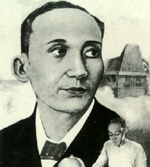


Apolinario Mabini was born in the barrio of Talaga, Tanauan, Batangas, on July 23, 1864.
The second son of Inocencio Mabini and Dionisia Maranan.
Mabini obtained his early education from his grandfather and his mother, who taught him
the rudiments of reading writing and arithmetic later, he enrolled in the primary school of Simplicio Avelino supporting
himself by working a muchacho. During his third year in high school, Mabini won first prize, a silver medal and a diploma
of honor for the course in Universal History, in a competition for scholarship conducted by the college of San Juan de Letran
in Manila. He was able to obtain a new teaching position in the school of Sebastian Virrey.
In March 1887, desirous of continuing his studies, Mabini took and passed the required
examination at the university of Santo Tomas, obtaining the degree of Bachelor of Arts completed the course in 1894.
In the examination for Licentiate in Jurisprudence on March 2, 1894, he obtained the grade of 'excellent'. He became a
copyist in the court of first Instance of Manila.
It was in January 1896 that he contracted a severe fever which resulted in his permanent paralysis.
His physical condition prevented him from taking a more active part in the revolutionary movement. Despite of his physical
condition, Mabini played a prominent part in the second period of revolution. He planned the revolutionary government and
acted as the Prime Minister of President Emilio Aguinaldo. He occupied the positions of President
of the Government council and secretary of Foreign affairs. His programa constitutional dela Republica Filipina was one
of the models of the Malolos constitution. His works earned for him the title 'brains of the revolution' as well as the 'sublime paralytic.'
In August 1899, the revolutionary congress elected him chief justice of the supreme court.
Mabini was captured by the American's in December 1899. He was released from prison on October 3, 1900.
He lived in a small nipa house in Manila where he barely supported himself writing political articles. (El Simil de Alejandro) prompted
the Americans to exile him to the island of Guam. After August 1901, because of his refusal to sign the required oath of allegiance
to the U.S. after 17 months, he was convinced of the sincerity of American's good intentions in his country, he agreed to take the required oath.
He was back in the Philippines on February 26, 1903.
Mabini died of cholera in Manila on May 13, 1903 at the age of 39.
